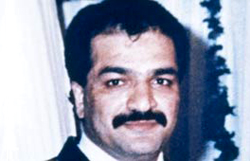Mumbai, Aug 7: The Maharashtra government has denied that absconding mafia don Mushtaque alias Tiger Memon allegedly called up his mother and threatened to avenge his brother Yakub Memon's hanging last week, top officials said here on Friday.
The Mumbai police, too, denied any such conversation as having taken place, as reported by a leading financial daily.
"We want to clarify that we don't have such intercepted conversation and we also clarify that such said transcript is not of Mumbai police," said DCP Dhananjay Kulkarni in a statement.
According to the report in the daily, Tiger Memon purportedly had a conversation with his mother Hanifa Memon at her Mahim residence here on July 30 around 5.30 a.m. - barely an hour before Yakub was hanged in Nagpur Central Jail.
In the conversation with a weeping Hanifa, Tiger Memon allegedly "vowed" to "avenge" his brother's death and "make them pay for it".
The newspaper has stated it is in possession of the transcript of the entire three-minute conversation conducted over the Internet, with the call bouncing from one IP address to another, making it difficult to track. It is not clear who recorded the mother-son dialogue.





Comments
Add new comment